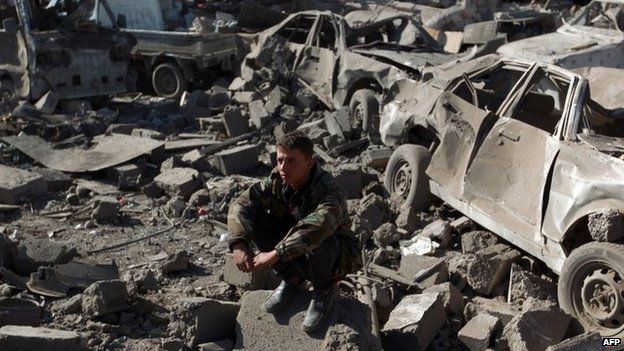Fallout from Syria war exacerbates tensions over Yemen
- Published

The crisis in Yemen is a sign of the tension between the two regional superpowers, Saudi Arabia and Iran. It is the latest in a series of crises in a region that is becoming even less stable, says BBC Middle East editor Jeremy Bowen.
The failure of the world's big powers to summon the will to stop the war in Syria is looking to be an even more serious mistake than it has for the last four years.
It is not just the lives that have been lost in Syria itself. It is the impact the war is having on a fragile part of the world
The fallout from the Syrian war is superheating tensions that existed already.
The latest place in this troubled region to reach boiling point is Yemen.
It has plenty of its own internal problems. But without trouble exported from Syria they would not probably have become part of an international crisis.
Shia-Sunni faultline
First, there is the sectarian nature of much of the killing in Syria.
It has caused suspicion and bloodshed between Shia and Sunni Muslims in many places where they live alongside each other - Yemen is the latest to make it into the headlines.
At the same time, the cold war between Sunni Saudi Arabia and Shia Iran, facing each other across the Gulf, has plunged them into a series of proxy wars.
The two big powers back opposing sides in the wars in Syria, Iraq and now in Yemen too.
Iran has boasted of its influence in all three countries, as well as in Lebanon, which clings to a shaky peace.
If Iran signs an international deal on its nuclear programme, sanctions on it will be lifted and its economy could revive strongly.
One view of Iran is that it wants to safeguard itself, not dominate its neighbours, but that is not how it looks from Riyadh, the Saudi capital.
The Saudis, with a new king, and lower oil revenues fear Iran is in an expansive, aggressive phase, and no longer believe that the Americans will stick with them through thick and thin.
Rivalry, and conflict, would have existed without the Syrian war. But Syria opens new wounds and reopens old ones.
They are bleeding out right along the Shia-Sunni fault-line, from Syria on the Mediterranean coast, down through Iraq to the southern end of the Gulf, on to Yemen and across the Arabian Sea to the Indian sub-continent.
- Published14 April 2023
- Published22 March 2015